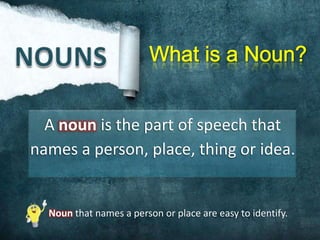Signaler
Partager

Recommandé
Recommandé
Contenu connexe
Tendances
Tendances (20)
Personal Pronouns, Possessive Adjectives and Possessive Pronouns!

Personal Pronouns, Possessive Adjectives and Possessive Pronouns!
Tricky Inflectional Endings: when to change the y to i

Tricky Inflectional Endings: when to change the y to i
Similaire à What is a noun
Similaire à What is a noun (18)
What is a noun
- 1. NOUNS Whatis a Noun? A nounis the part of speech that names a person, place, thing or idea. Nounthat names a person or place are easy to identify.
- 2. Nouns Can be PROPER COMMON and CONCRETE ABSTRACT COLLECTIVE COMPOUND
- 4. Are capitalized. 1. On November 2006, Miss Gunguvisited England. EXAMPLE 2. The Tower Bridge over the Thames Riverhas become an iconic symbol of London. Proper nounsis the opposite of a common noun.
- 5. CommonNouns Names any of a class of people, places or things. 1. The lady took many pictures of a bridge. EXAMPLE 2. The bridge consists of two towerswhich are tied together at the upper level. Any nouncan be categorized as either common or proper.
- 6. Concrete Nouns Names things that we can SEE SMELL TOUCH CONCRETE NOUNS Music HEAR TASTE Person
- 7. ABSTRACT NOUNS Names something you can not perceive through the five senses: see, touch, taste, hear, smell. Independence Love Loyalty Hope Intelligence
- 8. COLLECTIVE NOUNS Names a group of people or things acting as a unit Troop Army Crew Audience Faculty Class Legislature Looks Singular but its meaning may be Singular or Plural
- 9. COMPOUND NOUNS Made up of two or more words acting as single unit Can be